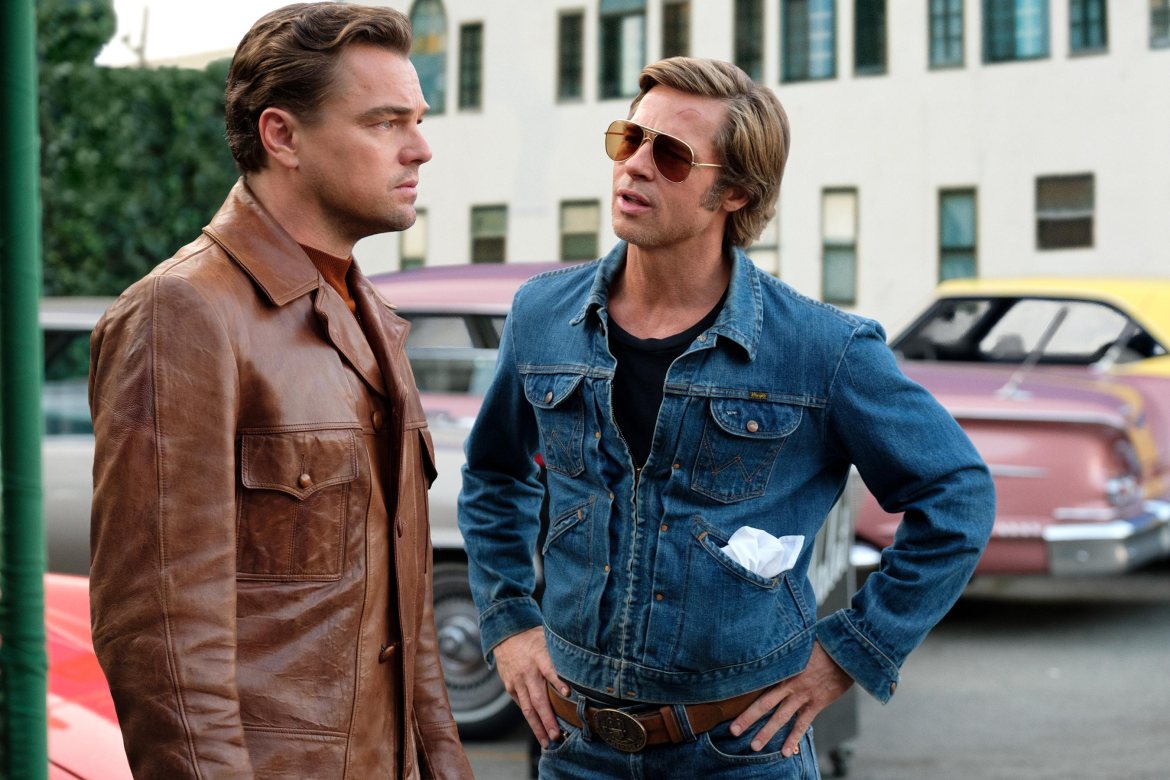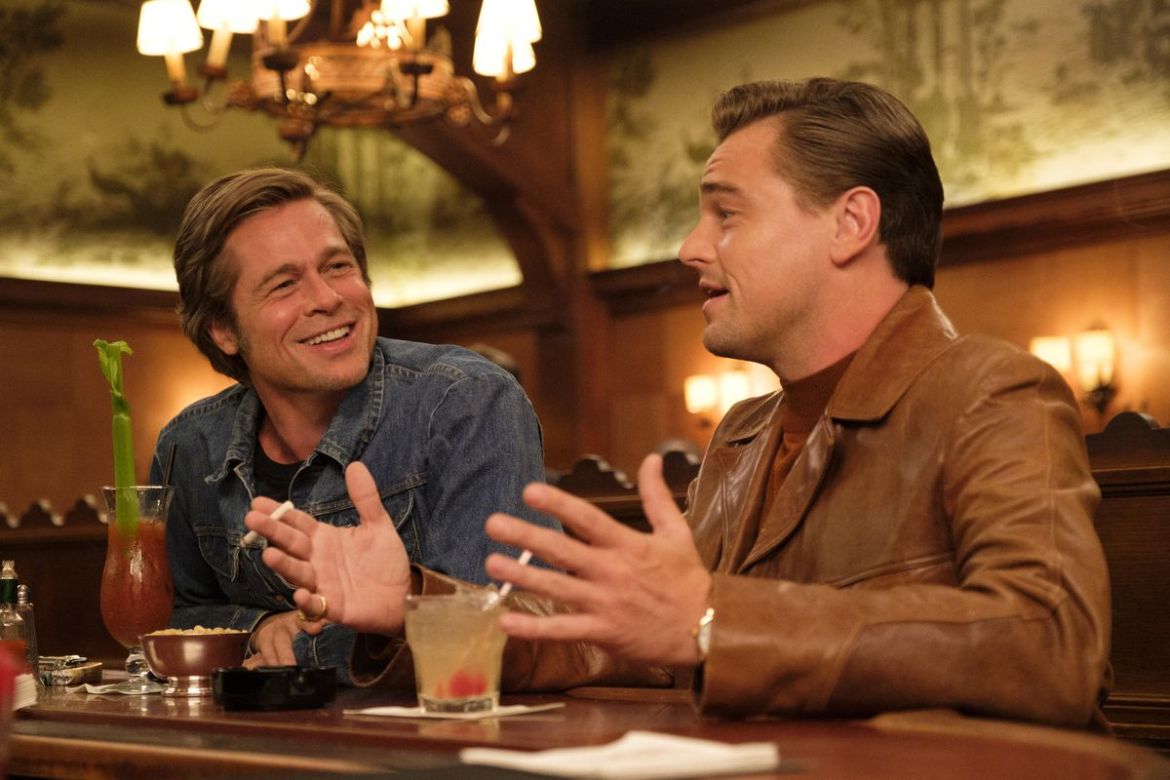
When one talks about director Quentin Tarantino it’s worth it to ret-con the quote from Thomas Aquinas; for those who love him, no criticism will ever be possible and for those who hate him no criticism is necessary. That is to say whatever I lay out in this review of his latest effort, Once Upon a Time…in Hollywood, your mind will be made up based on your preconceived notions of the director himself. Once Upon a Time…in Hollywood is a vanity project and nothing more. An opus to an era gone by with little more than a pie-eyed reverence for cinema with a completely vapid sense of analysis. With a cast as large (and wasted) as a Terence Malick movie, Tarantino’s latest will certainly leave casualties on both sides of the film debate.
Set in the fading years of the late ’60s, Rick Dalton (Leonardo DiCaprio) is a formerly successful television star now fighting for relevance. The only person he can rely on is his stuntman and guy Friday, Cliff Booth (Brad Pitt). As the two search for meaning in a Los Angeles filled with hippies and auteurism they ultimately find themselves at the center of the biggest tragedy to rock the L.A. landscape that year.
There’s certainly never been any doubt that Tarantino, in a similar vein to Martin Scorsese, loves movies. Once Upon a Time…in Hollywood is practically a 3-hour commercial for the power of classic era film and television. The question is what’s the point of it all? As it plays in the feature, it’s just a chance for Tarantino to recreate things he loves while offering no analysis of the past, why it’s endured, or why it’s flawed. In fact, Tarantino seems to love thumbing his nose at what he probably perceives as Hollywood’s new woke sentimentality.
In this film men have no compunction punching women in the face and leering at underage girls in bikini tops, while a little girl refusing to be called “pumpkin puss” is comical because “haha, woke!” But there were certainly issues within the classic era of film and television, and it would have certainly been nice for Tarantino to want to show why fans of these movies and shows still love them, in spite of the rampant racism and sexism that exists.
Then again, it’s hard to find out what Tarantino wants to say at all. Clocking in at nearly three-hours, Once Upon a Time…in Hollywood is the director at his most aimless and unstructured. Unlike his past features, cleanly divided into segments, plots start and stop with all the abruptness of a truck slamming its brakes on. Wandering scenes of Brad Pitt driving down Los Angeles streets will cut to Margot Robbie’s Sharon Tate walking to a movie theater, the camera firmly stuck on either her backside or legs (the only view we get of most women here). Occasionally there are moments of story, generally relegated to Cliff and Rick’s enduring friendship, and Rick’s antipathy towards transitioning to the new phase in his career: spaghetti Westerns.

DiCaprio and Pitt are the stars of this movie, not just in being A-list actors but because they’re the only characters with anything passing for a cogent plot. The two have an easy camaraderie together, with DiCaprio’s Rick constantly crying and needing reassurance from his calm and collected bestie/chauffeur. Rick Dalton is pulled from other DiCaprio characters, particularly Wolf of Wall Street’s Jordan Belfort and Django’s Calvin Candie, so DiCaprio gets to have a lot of fun rocking silly wigs and freaking out. A nearly half an hour setpiece sees DiCaprio’s Dalton starring in an episode of a Western show called Lancer, which is fun to watch as DiCaprio channels an Old Hollywood villain. The subplot is a total divergence but a watchable one.
Pitt’s Cliff Booth is truly the scene stealer, evoking Robert Redford’s ’70s mien so well as to be a direct copycat. He has absolutely nothing to do, short of a bizarre subplot where he’s presumed to have murdered his wife. (It’s okay! She had it coming!) Cliff also acts as the conduit for the introduction of the Manson family, a factor heavily played up in the trailers but all but invisible in the finished product outside of, again, a long-winding scene between Cliff, the Manson girls (played with lip-biting intensity by Margaret Qualley and apathy by Dakota Fanning, respectively), and George Spahn (Bruce Dern).
Tarantino’s taken criticism for the lack of lines given to Margot Robbie’s Sharon Tate and it’s criticism that’s deserved. Robbie is flat-out wasted and excising her character completely would have worked just as well. She’s literal more than a walk representation of death, with a clock ticking down to her demise in the third act. Robbie is certainly beautiful, but that’s what she’s there for, the camera constantly crawling up her body as she sleeps and dances. Male characters talk about her life and what she’s thinking, while the only dialogue we hear from her falls to frivolous things like her movies or music. Anything meaningful she might want to say is literally drowned out by needle drops, as if Tarantino himself doesn’t care what she has to say. She’s meant to represent death and sexiness. The Manson girls get more of an opportunity to talk than their greatest victim.
And with a third act “twist” looming over everything, the ultimate take away from Once Upon a Time…in Hollywood is that the Manson family got lucky. Presented as buffoonish, entitled millennials, Manson himself (played in one scene by Damon Harriman) doesn’t even warrant any significant presentation and his acolytes aren’t organized but dumb succubi looking to dupe unsuspecting men. The third act takes gleeful joy in flipping the script, but unlike Inglourious Basterds’ revision of history this take is offensive and actively seeks to undermine the deaths the took place.
Once Upon a Time…in Hollywood is certainly a delight for its technical aspects – the production design and costumes certainly warrant an Award – but that’s the nicest thing that can be said. This near-three-hour opus is a wandering mess of half-though ideas and interests, as if Tarantino couldn’t focus and decided to throw in everything to pass his brain that day. The movie desperately needs additional editing and development, instead playing as a hacked piece of classic film ephemera. If Tarantino wants to retire so badly, he should do so.


urmom
What the fuck, Karen?
Karen M. Peterson
Kristen wrote this, but thank you for playing.